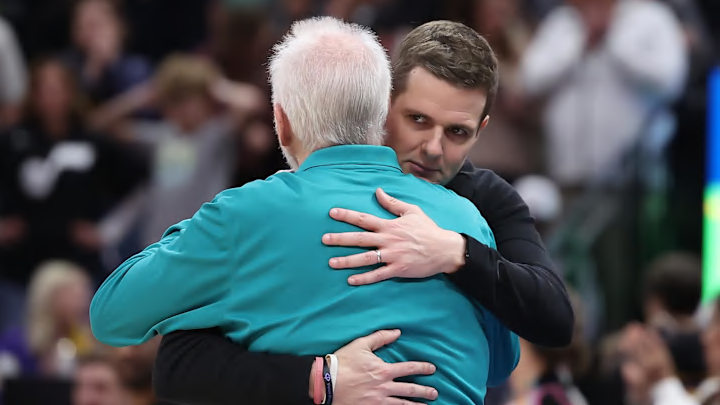The news that Gregg Popovich would be stepping down as head coach of the San Antonio Spurs was an emotional gut punch for pretty much any basketball fan. It was also not altogether unexpected, given the gravity of the health issues he has dealt with this past year.
Less expected: San Antonio naming Coach Pop's successor almost immediately thereafter. Interim head coach Mitch Johnson is being tapped to replace one of the sideline GOATs, a somewhat controversial decision since it doesn't seem as if the Spurs thoroughly canvassed other options to fill perhaps the league's most attractive job. (Who wouldn't want to chaperone Victor Wembanyama into the future, ya know?)
Yet, while Spurs fans and pundits and general hoops heads debate the merit of this decision, one team emerges from the news as potentially the biggest winner of all: The Utah Jazz. Their victory is indirect, but nonetheless critical. Because now that Johnson is leading the Spurs, it means Utah's current head coach, Will Hardy, is here to stay.
Chatter around the league suggested Spurs would try to poach Will Hardy
As The Athletic's John Hollinger noted on a recent episode of the Hollinger & Duncan NBA Show, there were "rumblings" around the NBA that the Spurs would look to poach Hardy from the Jazz. With Johnson at the helm in San Antonio now, it seems that these rumors were overblown, or that Hardy didn't have any interest in returning to the organization where he got his start as an assistant coach.
Either way, this is huge (non-)news for the Jazz. Sure, Hardy is under contract through the 2026-27 season after the team picked up his fifth-year option this past September. But coaching agreements are fungible. It is easier for them to get out of their current deals than it would be for players, who don't really have much recourse in that department.
This isn't to say Utah was ever in danger of losing Hardy for nothing—if at all. Teams can shut down outside interest in head honchos under contract. When they don't, they usually receive compensation for letting coaches out of their existing deals.
The Los Angeles Clippers, as one example, sent a first-round pick to the Boston Celtics to poach Doc Rivers in 2015. Current Jazz CEO Danny Ainge was running the show in Beantown back then, so you know he would have capitalized on Hardy's exit if it came to that.
It didn't. That's huge for the Jazz.
Will Hardy is an elite NBA head coach
Hardy has demonstrated exceptional value over the past three years, particularly for the brand of offense he runs. Utah receives flak for not tanking sooner in the previous two seasons, which is fair. But overachieving relative to your personnel shouldn't be viewed as a bad thing.
Though those stretches of obliterated expectations are a testament to everyone involved, they speak to Hardy's innovation and approach. His system helped unleash Lauri Markkanen as an All-Star-caliber player, and he has found ways to integrate and capture the attention of veterans on different timelines than the Jazz without compromising the development of young players.
Granted, Hardy's tenure has not led to the emergence of a tent-pole building block. Utah is still looking for that player heading into the 2025 NBA draft. Most recently, though, Hardy has overseen rookie-year breakouts from Kyle Filipowski and Isaiah Collier, a sophomore jump from Brice Sensabaugh (especially post-All-Star break), and a third-season renaissance from Walker Kessler.
No, the Jazz have not yet completed the hardest part of their rebuild: finding that franchise cornerstone. But they can rest assured knowing they have a coach who can identify and bring out the most in that player once they do. That's no small feat.
In many ways, Hardy currently is Utah's best building block. That isn't ideal, even if it is temporary. But it's also proof of Hardy's value—and cause for Jazz fans to celebrate that the biggest threat to losing him is no longer a threat at all.
